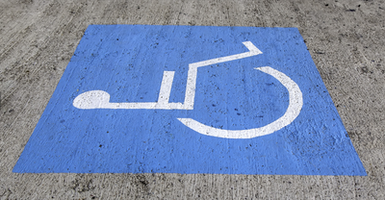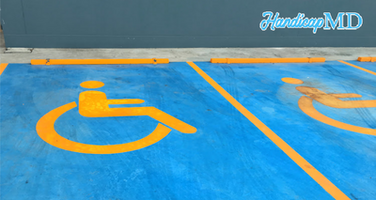
Disabled Parking Permit in Chesapeake: How to Obtain and Use a Handicap Parking Permit
Navigating daily life with a disability can be challenging, but tools like disability tags make it easier for individuals to access essential services and accessible spaces. Disability tags help eligible individuals access designated areas designed to accommodate mobility and accessibility needs. This guide explores how to obtain and use a disability tag in Chesapeake, including eligibility requirements, the types of tags available, and step-by-step application instructions.
What is a Disabled Parking Permit?
A disability tag, also known as a disability placard or disability tag, is a special pass issued to individuals with qualifying disabilities. This tag allows access to specially designated spaces, making it easier for individuals with mobility challenges to park closer to entrances and services.
The Importance of Disabled Parking Permits and Their Role in Enhancing Accessibility
Disability tags are not just a convenience; they are a critical tool for empowering individuals with disabilities by providing equal access to essential services and opportunities. These tags serve as a visible marker of accessibility needs, ensuring that people with mobility challenges can park closer to entrances, access specialized spaces, and navigate public spaces more easily.
Enhancing Independence and Mobility
For many individuals with disabilities, mobility can be a significant barrier to daily life. Disability tags reduce these challenges by:
- Providing Close Proximity Access: Accessible spaces near building entrances minimize the physical effort required to access services.
- Supporting Health and Safety: By reducing the need to walk long distances or navigate crowded areas, disability tags protect individuals from potential health risks, fatigue, or injury.
- Encouraging Social Inclusion: With accessible spots, individuals can participate more freely in community activities, work, and social events.
Promoting Awareness and Compliance
The presence of disability tags also plays a vital role in fostering awareness among the public about accessibility needs. It reminds businesses, property owners, and the general community of their responsibility to maintain designated accessible spaces and uphold ADA regulations.
Benefits of Obtaining a Disabled Permit in Chesapeake
Residents with qualifying disabilities can experience a wide range of benefits from obtaining a disability tag, including:
Improved Access to Essential Services
- Disability tags make it easier to visit healthcare facilities, shopping centers, and government offices by providing designated spaces close to entrances.
Legal Protections
- Holding a disability tag ensures that individuals have the legal right to park in accessible spaces, shielding them from violations when using designated spots appropriately.
Travel Convenience
- City-issued disability tags are recognized nationwide, enabling seamless travel and access across the U.S.
Reduced Stress and Effort
- By minimizing the distance and obstacles required to reach a destination, disability tags alleviate the physical and emotional strain of navigating busy or inaccessible areas.
Tailored Solutions
- With options like temporary and permanent tags or license plates, the city accommodates a variety of needs, from short-term recovery to long-term mobility challenges.
Obtaining a disability tag is a step toward greater freedom, inclusion, and quality of life for individuals with disabilities. It empowers them to access public spaces with dignity and ease, ensuring that mobility challenges do not hinder their ability to thrive.
Eligibility Criteria
To qualify for a handicap permit in Chesapeake, individuals must meet specific medical and functional criteria. The Commonwealth of VA issues disability tags to residents with disabilities that severely impair their ability to walk or require mobility aids.
Here are the main eligibility requirements:
- Inability to Walk 200 Feet Without Rest: Individuals who cannot walk this distance without experiencing pain, fatigue, or shortness of breath.
- Severe Mobility Impairments: Those requiring assistive devices like wheelchairs, crutches, canes, prosthetic devices, or walkers.
- Lung Disease: Measured by specific pulmonary function tests, such as forced expiratory volume.
- Cardiac Conditions: Classified under the American Heart Association's Class III or IV functional limitations.
- Legal Blindness: Individuals who are blind or visually impaired.
Common Medical Conditions and Examples
Many medical conditions may qualify for a disability tag. Here are a few examples:
- Arthritis: Severe forms of arthritis that limit mobility or cause chronic pain.
- Neurological Disorders: Conditions such as multiple sclerosis (MS), Parkinson’s disease, or muscular dystrophy.
- Chronic Pain or Fatigue Syndromes: Severe fibromyalgia or chronic fatigue syndrome (CFS).
- Respiratory Conditions: Chronic obstructive pulmonary disease (COPD), asthma, or lung cancer.
Different Types of Handicap Permits Available in Chesapeake
The city offers several types of disability tags, each serving a specific purpose. Here are the primary options:
Permanent Disability Tags
- For individuals with long-term or permanent disabilities.
- Issued for five years and renewable.
Temporary Disability Tags
- For temporary conditions, such as post-surgery recovery.
- Valid for up to six months.
Disability License Plates
- Permanent plates installed on a vehicle owned or primarily used by the individual with the disability.
- Includes the international symbol of accessibility.
Special Disability Veteran Plates
- For veterans with service-connected disabilities.
- May offer additional benefits, including fee exemptions.
Each type of tag has specific documentation and renewal requirements, ensuring that only those with qualifying disabilities utilize these privileges.
Step-by-Step Application Process for a Disabled Permit in Chesapeake
Obtaining a handicap placard in Chesapeake involves a straightforward process, which can be completed in a few simple steps:
- Have a licensed healthcare provider to complete the "Physician’s Certification of Disability" form (available on the state DMV website).
- Ensure the form is signed and dated.
Complete the Application
- Fill out the "Disabled Parking Placard or License Plates Application" form (Form MED 10). This can be downloaded from the state DMV website or obtained at a local DMV office.
Submit the Application
- Submit the completed application and medical certification in person or by mail to the DMV.
- Pay the required fee (if applicable). Temporary tags usually have a nominal fee, while permanent tags may be free of charge.
Receive and Use Your Tag
- Once approved, you will receive your disability tag or plates.
- Place the tag on the rearview mirror or display the plates on your vehicle.
Fees
City-issed disability tags come with minimal or no fees depending on the type:
- Permanent Disability Passes: No fee for the initial issuance or renewal.
- Temporary Disability Passes: A nominal fee (usually $5) for issuance.
- Disability License Plates: Standard registration fees apply, but additional fees may be waived for certain categories, like veterans with disabilities.
For specific details, contact the state Department of Motor Vehicles (DMV) or check their website.
Benefits of Using HandicapMD.com for Online Applications
HandicapMD.com offers a convenient, user-friendly platform for individuals seeking to apply for handicap placards. The website streamlines the application process, eliminating the need for lengthy in-person visits and ensuring that users can complete their applications efficiently and accurately.
Key Benefits:
Ease of Use:
- The platform features a simple, step-by-step interface, making it easy for users of all technical skill levels to navigate.
Time-Saving:
- Skip the hassle of visiting a DMV office. HandicapMD.com allows you to apply from the comfort of your home, reducing wait times and saving valuable time.
Access to Expert Support:
- The platform provides guidance and answers to frequently asked questions, ensuring users understand every step of the process.
Secure Document Submission:
- Upload required documents, such as medical certifications, through a secure portal, protecting sensitive personal information.
Track Your Application:
- HandicapMD.com offers tracking features, so you can monitor the progress of your application in real time.
Inclusive Accessibility:
- Designed with accessibility in mind, the platform caters to individuals with disabilities, ensuring an inclusive and seamless experience.
Walkthrough of the HandicapMD.com Application Process
Applying for a disability tag through HandicapMD.com is straightforward and hassle-free. Here’s a step-by-step guide:
Create an Account:
- Visit HandicapMD.com and create an account with your email address and a secure password.
Select Your Application Type:
- Choose the type of disability tag you need (e.g., temporary tag, permanent tag, or disability license plate).
Complete the Online Form:
- Fill out the application form with your personal details, including your name, address, and disability information.
Upload Required Documents:
- Attach your medical certification form signed by a licensed healthcare provider. The platform provides clear instructions on acceptable file formats and size limits.
Review and Submit:
- Double-check your information for accuracy before submitting your application. HandicapMD.com allows users to save progress and review details as needed.
Pay Applicable Fees:
- Pay any required fees securely through the website using a credit or debit card.
Track Your Application:
- Once submitted, you can track the status of your application and receive updates via email or through your HandicapMD.com account.
Why Applying Online is the Best Option
Applying online through HandicapMD.com is the preferred choice for many applicants due to its efficiency and convenience. Here’s why:
Convenience:
- Apply anytime, anywhere, without needing to adhere to DMV office hours.
Faster Processing:
- Online submissions are typically processed more quickly than paper applications, reducing the time it takes to receive your disability tag.
Eliminates In-Person Barriers:
- For individuals with mobility challenges or health concerns, online applications remove the need for travel and long waits at government offices.
User-Friendly Design:
- HandicapMD.com simplifies complex processes, guiding users through each step with clear instructions and support.
Cost Efficiency:
- Save on travel expenses and reduce time off work or other commitments by completing your application from home.
Environmental Impact:
- Online applications reduce the need for paper forms, contributing to a more sustainable process.
By leveraging the tools and resources available on HandicapMD.com, you can enjoy a smooth, stress-free experience while ensuring your application is submitted accurately and promptly. Choose HandicapMD.com to make obtaining your disability tag as straightforward and convenient as possible.
Validity and Expiration
Virginia handicap placards have different validity periods based on the type:
- Permanent Disability Passes: Valid for five years, expiring on the last day of the birth month of the tag holder.
- Temporary Disability Passes: Valid for six months or less, depending on the medical recommendation.
- Disability License Plates: Valid as long as the vehicle registration is current, requiring renewal annually.
Renewal Process
Renewing your disability tag is straightforward:
- Permanent Tags: A renewal notice is typically sent by mail. Submit the renewal application either online, by mail, or in person at the DMV.
- Temporary Tags: You must complete a new application with updated medical certification if the disability persists beyond the original expiration date.
- Disability License Plates: Renew your vehicle registration annually to maintain the plates.
Keep in mind that permanent tag holders may not need new medical certification during renewal.
Replacing Lost, Stolen, or Damaged Handicap Permits
If your disability tag is lost, stolen, or damaged, follow these steps:
- Report Theft (if applicable): Notify local law enforcement if the tag was stolen.
- Complete a Replacement Form: Submit a "Disabled Placard or License Plates Application" form (Form MED 10) to request a replacement.
- Pay the Fee: A small replacement fee may apply.
- Submit the Application: Apply in person at the Virginia DMV or mail the form to the appropriate address.
Replacement requests usually require proof of identity and details of the lost or damaged tag.
What is Disabled Parking?
Disabled parking refers to designated spaces reserved exclusively for individuals with disabilities. These spaces are marked with the International Symbol of Accessibility and are strategically located to provide easier access to buildings, facilities, and services. Accessible spaces ensures that individuals with mobility challenges can park close to entrances, navigate public spaces safely, and maintain their independence.
Key Features of Accessible Spaces:
- Close Proximity: Spaces are typically near entrances or elevators for convenience.
- Wide Dimensions: Many spaces are larger to accommodate wheelchairs, mobility devices, or vehicles with lifts.
- Striped Access Aisles: These adjacent zones allow for wheelchair ramps or additional space for exiting vehicles.
- Signage: Clearly marked with visible signs and pavement symbols to identify accessibility.
Accessible spaces is a critical resource for fostering inclusivity and equal access for individuals with disabilities.
Tips for Using Accessible Parking Responsibly
To ensure accessible spaces remain available to those who genuinely need them, it’s important to use them responsibly. Here are some best practices:
1. Only Use Spaces if Authorized:
- Park in accessible spaces only if you have a valid disability tag or license plate issued in your name.
2. Properly Display Your Tag:
- Hang your tag on the rearview mirror or ensure your disability plates are visible when using accessible spaces.
3. Avoid Blocking Access Aisles:
- The striped areas next to accessible spaces are essential for individuals using mobility devices. Do not park or stop in these zones.
4. Follow Time Limits:
- Respect any posted time restrictions, especially in high-demand areas, to ensure others can use the space.
5. Don’t Share Your Tag:
- Using someone else’s disability tag or allowing another person to use yours is illegal and unethical.
6. Report Abuse:
- If you witness unauthorized use of accessible spaces, report it to local authorities to help maintain fairness and availability.
By following these tips, you contribute to a system that supports accessibility and fairness for everyone.
Rules for Using Disabled Parking in Chesapeake
Using a disability tag comes with responsibilities. The city enforces strict regulations to ensure accessible spaces are available to those who need them:
- Proper Display: Hang the tag from the rearview mirror when parked or display the disability plates.
- Authorized Use Only: Only the person to whom the tag is issued can use it. Misuse may result in fines, revocation, or legal action.
- Time Restrictions: Follow posted time limits for accessible spaces unless otherwise noted.
- No Blocking Access: Do not park in striped access aisles adjacent to accessible spaces.
Regulations for Parking in Accessible Spaces
Accessible spaces are reserved for individuals with disabilities and include:
- Marked Spaces: Look for the International Symbol of Accessibility.
- Van-Accessible Spaces: Wider spaces designed for vehicles with ramps or lifts.
Unauthorized use of accessible spaces may result in fines of up to $500 or towing at the owner's expense.
Where Can You Park with a Handicap Permit in Chesapeake?
With a disability tag, you can park in designated accessible spaces located at:
- Public buildings and facilities
- Shopping centers and malls
- Healthcare centers
- Schools and libraries
- Entertainment venues
Always ensure the space is marked with proper signage or ground markings.
Is Handicap Parking Free in Chesapeake?
In most cases, accessible spaces in the city is free, especially on public streets and at municipal facilities. However, some private lots or garages may charge a fee, even for accessible spaces. Be sure to check the posted rules or inquire with facility management for clarification.
Penalties for Misusing Accessible Spaces
Misusing accessible spaces is a serious violation that disrupts access for those who genuinely need these accommodations. The city enforces strict penalties to deter misuse.
Common Violations
Parking Without Proper Authorization:
- Occupying an accessible space without a valid disability tag or license plate.
- Fine: Up to $500 and possible vehicle towing.
Improper Display of Tags:
- Failing to display the tag visibly while parked in an accessible space.
- Consequence: Citation and fine.
Using Someone Else’s Disability Tag:
- Using a disability tag or plates issued to another individual.
- Consequence: Fines, confiscation of the tag, and potential criminal charges.
Occupying Access Aisles:
- Blocking the striped access aisle adjacent to accessible spaces.
- Fine: Similar when occupying an accessible space without authorization.
Consequences
Violators may face the following penalties:
- Fines ranging from $100 to $500.
- Towing and impound fees for vehicles parked illegally.
- Revocation of the disability tag for improper use.
To report misuse, contact local law enforcement or city authorities.
How to Display Your Disabled Permit Correctly
Proper display of your disability tag ensures compliance with regulations and prevents fines. Here’s how to display your tag correctly:
Placards:
- Hang the tag on the rearview mirror while the vehicle is parked in an accessible space.
- Remove the tag when driving to avoid obstructing visibility.
License Plates:
- Ensure the plates are permanently affixed to your vehicle.
- Keep the vehicle registration up to date.
Temporary Tags:
- Follow the same rules as permanent tags but note the expiration date prominently.
Always double-check that your tag is visible from the outside when parked in accessible spaces.
Using Your Chesapeake Disabled Parking Permit in Other States
City-issued disability tags are valid across all 50 states under the Americans with Disabilities Act (ADA). However, it’s essential to understand the rules of the state or jurisdiction you’re visiting:
General Reciprocity:
- Most states honor out-of-state disability tags for accessible spaces.
- You can park in any designated accessible space, provided you follow local rules.
State-Specific Regulations:
- Some states may have additional requirements, such as time limits for accessible spots or specific display rules.
- Research the local laws of your destination to avoid fines.
International Use:
- Disability tags may not be recognized abroad. If traveling internationally, check with the country’s consulate or embassy for specific guidelines.
By understanding these rules, you can confidently use your city-issued disability tag wherever you go. Always ensure the tag is valid and displayed correctly to avoid misunderstandings or penalties.
Common Myths and Misunderstandings About Handicap Permits
Misconceptions about disability tags can lead to stigma, misuse, or misunderstanding. Here are some common myths debunked:
Myth 1: Disability Tags Are Only for People in Wheelchairs
- Fact: Many disabilities are invisible, such as respiratory conditions, chronic pain, or cardiac issues. Disability tags are issued based on medical need, not just visible impairments.
Myth 2: You Can Park Anywhere With a Disability Tag
- Fact: Disability tags only grant access to designated accessible spaces. Occupying illegally in no-parking zones or fire lanes is still prohibited.
Myth 3: Accessible Spaces is Free Everywhere
- Fact: While many public spaces offer free access, some private lots or garages may charge a fee for all users, including those with disability tags.
Myth 4: It’s Okay to Use a Family Member’s Tag
- Fact: Disability tags are issued to specific individuals. Using someone else’s tag is illegal and may result in fines or penalties.
Myth 5: Temporary Disabilities Don’t Qualify
- Fact: Temporary disabilities, such as post-surgery recovery or injury, may qualify for a temporary tag if certified by a medical provider.
Myth 6: Accessible Spaces Are Always Available
- Fact: Accessible spaces can fill up quickly, especially in busy areas. This highlights the importance of using these spaces only when truly necessary.
By dispelling these myths and fostering better understanding, we can promote proper use of disability tags and ensure accessible benefits those who need it most.
FAQs
1. Who qualifies for a disability tag?
Individuals with conditions that impair mobility, such as those requiring assistive devices or with chronic respiratory or cardiac issues, may qualify. Eligibility is determined based on medical certification.
2. What types of disability tags are available?
The city offers permanent and temporary disability passes, as well as disability license plates and special veteran plates.
3. How much does it cost to obtain a disability tag?
Permanent tags are typically free, while temporary tags cost around $5. Standard vehicle registration fees may apply for disability license plates.
4. Can I use my city-issued disability tag in other states?
Yes, these disability tags are valid in all 50 states under ADA guidelines. However, ensure compliance with local regulations when traveling.
5. What do I do if my tag is lost or stolen?
Report the loss to local authorities (if stolen) and apply for a replacement through the DMV by submitting a new application form and paying any applicable fees.
6. Is accessible parking free in the city?
Yes, it is generally free in public spaces, but some private facilities may charge. Check posted signage or inquire with the property owner.
7. How do I renew my disability tag?
Permanent tags can be renewed online, by mail, or in person at the DMV. Temporary tags require a new medical certification for renewal.
Conclusion
Navigating the process of obtaining and using a disability tag in Chesapeake doesn’t have to be overwhelming. By understanding the eligibility requirements, application steps, and rules for proper use, you can gain the accessibility benefits these tags provide. Disability tags open doors to greater independence and ease of movement, ensuring everyone has the opportunity to participate fully in daily activities and events.
Ready to apply for your disability tag? Visit HandicapMD.com for step-by-step guidance, resources, and support in obtaining your tag. Start your journey to enhanced mobility and accessibility today!
.png)






